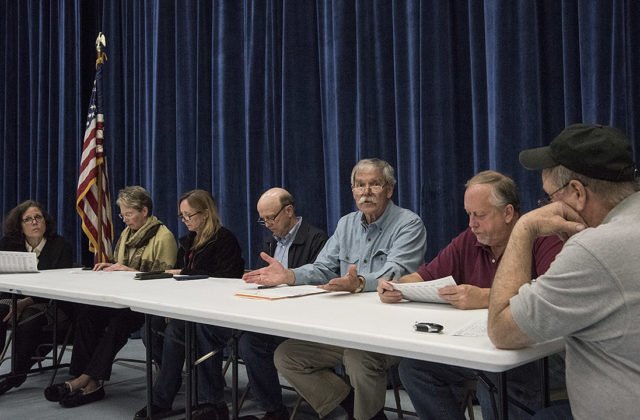Board of Finance Struggles to Keep Spending Down
Increases outnumber cuts
By Wiley Wood
On Monday, April 24, the Board of Finance held its annual budget hearing and presented a provisional budget for the next fiscal year. Despite a general effort to keep costs down, spending will go up slightly in the coming year and the mill rate will increase from 22.09 to 22.44, or about a third of a mill.
The mill rate describes the town’s tax on property. At the proposed mill rate of 22.44, residents will owe the town $22.44 per $1,000 of assessed property.
The main factors driving up spending were a $94,000 bump in Norfolk’s assessment for the Northwestern Regional School District No. 7, over which the town has little control; the debt service on two new plow trucks for the Public Works Department ($150,000 apiece) and a new pumper for the Norfolk Volunteer Fire Department ($350,000); a $50,000 increase in the road repair budget; and a $17,000 increase in incentive payments to emergency services volunteers, restoring the program to earlier levels. Town employees also received a union-mandated 2.5 percent pay hike, the first in several years.
The State of Connecticut, meanwhile, is proposing to cut its subsidy to the town’s education costs, known as ECS (Education Cost Sharing), by $36,000.
The town saved $12,000 by ending its five-day-a-week “Dial-a-Ride” bus program—the bus itself had to be scrapped, and town residents will now have two-day-a-week service on a regional bus. And the Board of Finance shaved $25,000 from Botelle School’s $2.5 million budget, on the heels of a $30,000 cut last year.
Although increases outweighed decreases, the Board of Finance was able to redress the balance somewhat by drawing $175,000 from the town’s positive fund balance, an amount well within the guidelines recommended by the town’s auditor.
In the coming year, the Town of Norfolk will need to raise $6,700,307 from its taxpayers, up $93,000 from last year.
The town’s annual meeting will be held on May 8, as mandated, but Board of Finance Chairman Michael Sconyers, citing uncertainties in the State of Connecticut’s budget, said “I honestly do not believe I’ll have a budget until June.”
Describing the provisional budget, Sconyers said, “This is bare bones. But we’ve got to be able to at least maintain the roads that are in the worst condition.”
As the governor attempts to make up the state’s budget deficits by shifting costs to towns, many northwest corner municipalities are feeling the pinch. “In North Canaan, they’re looking at a 3 mill increase, because they’re getting their whack on ECS this year,” said Sconyers.
Although Norfolk absorbed a $340,000 cut in ECS funding last year, its mill rate has increased only .03 mills in the past three years.
A proposal from the governor to make towns pay one third of the costs of teachers’ pensions—a measure that would cost Norfolk about $150,000—is meeting stiff opposition in the legislature.
“What I hear,” says Sconyers, “is that the governor hasn’t given up and is going to try to do it incrementally and sneak it up on us. And I do honestly believe it’s going to become a responsibility of the towns. But the statute’s going to have to change to give us the opportunity to do something about it, because right now you have the union contracts and that’s it.”
Photo by Bruce Frisch: Michael Sconyers, chairman of the Board of Finance (gesturing), will not present a final budget until June, after the State’s legislature has finalized itw own.

